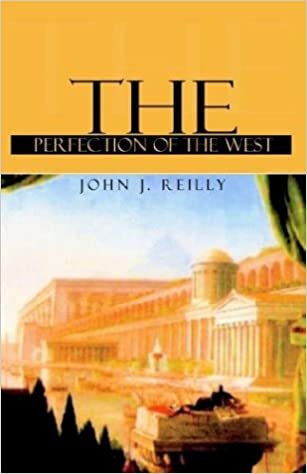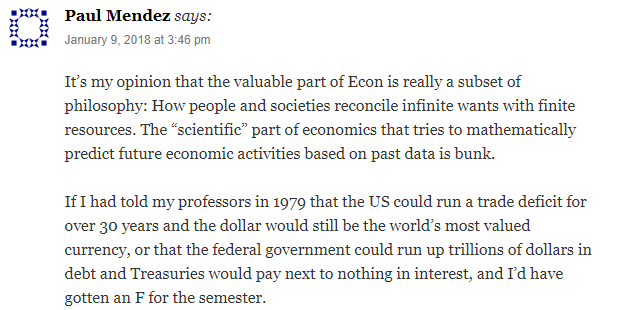The Long View 2008-10-11: The Crystallization of the West and the Election of 2008

John J. Reilly here alludes to, but does not name, Modern Monetary Theory, the slightly batshit but so far unrefuted idea that countries which control their own money supply can spend, borrow, and tax without constraint of tax receipts.
It sounds nuts. But it also keeps working. In much the same way that Gordon Chang, whose most famous book is referenced by John in this blog post, is still wrong about China’s financial system twenty years later. Chang’s description of the Chinese banking system sounds real bad, but it keeps chugging along. MMT is not observably different. Maybe someday it will all come crashing down, but it hasn’t yet.

The Crystallization of the West and the Election of 2008
No doubt the current emergency discussions among the finance ministers of the developed countries to remedy the financial crisis will fail, if they do not fail, then no doubt they will arrive at a counterproductive solution. The problem is monetary and capital-gains tax policies designed to generate financial bubbles. Now that the last bubble burst with the force of a mid-range nuclear warhead, the Great and the Good can think of no better recourse than to pump up the power of the bubble-blowing machine.
No matter: these pratfalls are not important. At the beginning of such episodes, no one really has a clue what to do. The point to keep in mind is that the world’s post-World War II financial system is being officially dismantled, after being hollowed out in reality in the course of the last two decades. This is happening as an example of one of the constant principles of history: government tends to expand to cover economic activity, both in terms of geography and of the type of activity. Ultimately, a world economic system means a world government, but that is not what is happening now. Rather, we are seeing the opening act of the integration of the economic governance of the First World countries, a group that includes most countries of Western culture, plus Japan.
The alternatives to this development have been tried and found wanting. Autarky, the first impulse of democracies in the face of a global crisis, was ill-advised in 1930 but imaginable, at least for a few major countries. In 2008, even for the United States, autarky is not just ill-advised but apocalyptically impossible. Similarly, the Grossraum-multipolarity option, though much discussed since the 1980s, imploded in the last few weeks even more thoroughly than the market for securitized mortgages. When faced with collective stress, the European Union did not act like an incipient Great Power. Its members broke apart in beggar-thy-neighbor quarrels. To the extent that the EU’s members were willing to coordinate policy, they wanted to do it in cooperation with Washington. As for the other possible Poles of a multipolar world, the collapse in commodity prices, and especially petroleum, will soon dim the reflected splendor of the recently resurgent Russian Federation. The same will be true even more so of the other ambitious moonlight states, Venezuela and Iran.
And China, which one really could imagine establishing a Grossraum? The problem is that, to the extent China has developed, it has developed to become an exporter. That choice now appears awkward in a world in which exports are likely to be in less demand. Meanwhile, China had already achieved something close to the Platonic ideal of bad banking. China was able to escape the natural consequences of this because of the tolerance (that is, the systematic indifference to asset quality) of the world financial system. This tolerance has evaporated.
As for the United States, it has been said for 20 years now that of course the US is militarily preeminent, but economically it is increasingly dependent on the kindness of strangers, or at least on their willingness to lend it money. Niall Ferguson has noted that America is the inverse of a proper empire, a great black hole of debt rather than a shining sun of capital-export. One of the great surprises of recent days, however, has been that the creditworthiness of the government of the United States is apparently indestructible, if not quite unfalsifiable. There is something uncanny about the ability of a government, a government that refuses to cover even ordinary expenses with tax revenues, to pledge 796 billion trillion dollars, or whatever the number was, and still see the demand for its currency rise.
This is a novel feature of the international system, one that demands more study. Nonetheless, perhaps we should not be wholly surprised. A book that merits reconsideration now is Walter Russell Mead’s Power, Terror, Peace and War. In that work, published four years ago, he suggests the Bush Administration is attempting to shift the world from a regime of essentially Keynesian “Fordism” to a more libertarian (and Jacksonian) “Millennialism,” a system that does not believe in monopolies or intermediaries. One might surmise from recent events that perhaps Millennialism needs work. In any case, here from my review is a summary of Mead’s point about one of the great discoveries of Anglo-Saxon economics:
Whatever else the US is becoming now, the author has little time for the argument that the US is like an overleveraged company on the verge of collapse. Regarding specifically the question of the ever-growing US debt, public and private, Mead notes that the founding of the Bank of England at the end of the 17th century turned England's debt into national strength. The Bank, and the novel possibility of a government honoring its obligations, gave the nation's creditors a stake in the system. Alexander Hamilton did the same a century later, when he insisted the federal government assume the debts of the states. The US government did it again in the second half of the 20th century, but globally.
This is something for the leaders and publics of the G7, when they are all once again in their right minds, to contemplate as they design a common institutional future.
At this point, it seems that the task of the next presidency will be to sponsor this new round of institution building. Again, we are not talking about global integration, but a crystallization of the West-plus-Japan with global implications. For that task, let us consider the merits of the two major candidates.
At first glance, Barack Obama might seem better suited to this role. As he will point out to anyone who will listen, he has a BA in International Relations, and he has at least lived abroad, though perhaps not in circumstances that invite close examination. Be that as it may, and despite the surly antipathy of his detractors, we must recognize that, if elected, he would be immediately and universally popular in a way that has no real precedent, except perhaps Woodrow Wilson immediately after World War I. He would be the first US president with not just a domestic but a global honeymoon. This would be especially the case in Europe where, if he knows what he is doing, his popularity could be used to help friendly but shaky governments make the reforms needed for transatlantic integration.
The problem is that Barack Obama seems to be one of those people whose grasp of reality is impeded by his education. There is a fair amount of romantic transnationalism in his understanding of international relations: none of this will help in carrying out a program of civilizational reform. His dearth of diplomatic experience, or useful international contacts, is as perfect as in every other area of government. (As I have remarked before, the word on the senator in Washington is that he has no shadow-government; his advisers are remarkably young and inexperienced, every one a Sarah Palin, but stultified by post-graduate degrees.) Globally, he really does seem to intend to start with a “kick me” security strategy. Moreover, he also seems to suffer from a confusion of “social investment” with patronage, which is embarrassing in Chicago but likely to do ruinous damage when applied to funding for NGOs and subsidies for fashionable tyrannies.
One might just flip these points to describe Senator McCain. Should he be elected, he and his Frosty the Amazon sidekick will immediately become the objects of contempt in the world’s media. McCain, however, unlike poor President Bush, is quite capable of turning this assessment around. He can charm the press when the press is in the mood to be charmed. Also unlike Senator Obama or Bush, he knows whom to call at 3:00 AM (their time, of course) everywhere in the world. The man’s been in government since Caesar was a pup, after all, and he’s particularly informed about the old NATO allies. He is also blessedly uncommitted on matters of economic principle. He’s the sort of man who takes advice; a valuable quality at a time like this.
But, you may ask, surely the Great Obamarama is now inevitable, and Senator McCain has no further function than to fade away? Maybe, but what I chiefly notice about the current campaign is not hostility by the mainstream media toward the senator, but the hostility of the Republican establishment. After the recent town-hall format debate, it seemed to me that Movement Conservatives were outraged at what was in fact a pretty good performance by the senator. They wanted him to promise dramatically lower taxes, again, and to accuse Obama to his face of high treason. I suspect it’s not so much that they really believed that a red-meat partisan campaign would work; it’s pretty clearly the case that, if McCain is going to win at all, he cannot do it without attracting voters beyond the Republican base. The problem for the Republican establishment is that they have made their careers through a strategy of trying to make the American political system act like a proportional representation system, in which elected officials represent only the people who vote for them. This approach worked in presidential contests when the electorate was configured in such a way that it was possible to campaign for 50% of the electoral votes, plus one. The downside was that it made ordinary government impossible. McCain understood that. His conservative opponents understand that their day will be over if McCain can show it is possible to win in another way.
As for the ontological incontestability of an Obama victory, let me end by quoting Theodore White in The Making of the President 1960 on the pro-Kennedy partisanship among the press covering the campaign:
By the last weeks of the campaign, those forty or fifty national correspondents who had followed Kennedy since the beginning of his election exertions into the November days had become more than a press corps – they had become his friends and, some of them, his most devoted admirers. When the bus or the plane rolled or flew through the night, they sang songs of their own composition about Mr. Nixon and the Republicans in chorus with the Kennedy staff and felt that they, too, were marching like soldiers of the Lord of the New Frontier.
These people reported that Kennedy was about to win by a landslide.
Copyright © 2008 by John J. Reilly



Comments ()